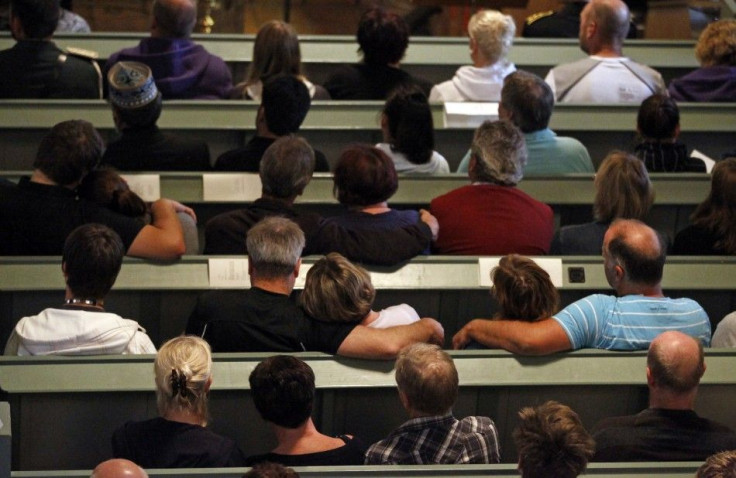Should Guns be allowed in Church? Georgia Appeals Court Weighs in on the Debate

Would you be comfortable if you knew that the person sitting next to you in the pew at church had a gun? That's the debate going on in Georgia right now. Should citizens of the state be allowed to carry guns to places of worship?
On Thursday, a federal appeals court in Atlanta is hearing from GeorgiaCarry.org, a guns' rights group that wants to overturn a Georgia state ban on guns in places of worship.
The 11th U.S. Circuit Court of Appeals in Atlanta is set to hear arguments Thursday on whether or not the 2010 law violates the First Amendment's religious freedom protections.
GeorgiaCarry.org maintains that religious institutions should be allowed to decide whether or not to allow firearms inside, not Georgia law.
GeorgiaCarry.org will not stop until our nation's forefathers' promise of 'Shall not be infringed' is achieved, a statement on the group's Web site argues.
According to court filings, only Georgia, Mississippi, Arkansas, and North Dakota specifically prohibit firearms in churches, mosques, and synagogues.
The ruling in Georgia came in 2010 when the Common Sense gun bill was passed in the General Assembly and signed into law on June 6 by Governor Sonny Perdue. The law prohibits guns in government buildings, courthouses, jails and prisons, state mental health facilities, bars (without permission of the owner), nuclear power facilities, within 150 feet of polling places, and places of worship.
The group's challenge, based on the First Amendment, is a novel approach in challenging gun law in that they are using the freedom of religion as a defense for something that would otherwise solely depend on the protections of the Second Amendment.
It's about whether or not the government should be making laws dealing with churches, Kelley Kinnett, a regular church goer and president of GeorgiaCarry.org, told the Atlanta Journal-Constitution. This is more of a First Amendment case than a Second Amendment case.
The group cites several articles on their Web site arguing that the roots of gun control are inherently racist and that the practice needs to end.
The historical record provides compelling evidence that racism underlies gun control laws - and not in any subtle way. Throughout much of American history, gun control was openly stated as a method for keeping blacks and Hispanics 'in their place,' and to quiet the racial fears of whites, an article entitled The Racist Roots of Gun Control states.
They also allude to a rising problem of gun violence in churches across America.
In Florida last month, a former deacon shot and wounded the pastor and associate pastor of his church before parishioners apprehended him.
Other incidents include two teenage boys who were wounded when three gunmen stormed a California church in 2010 and a lone gunman who killed two and wounded six at a Tennessee church in 2008 because he believed the church members were too liberal.
GeorgiaCarry.org further argues that churchgoers bring a lot of cash and that church workers must handle all of the tithing each week.
Why would you not want to take a gun? asked Jerry Henry, who works with GeorgiaCarry.org. Putting up this gun-free zone [in places of worship] makes that place accessible to attack. All we're asking for is to have the same option the criminal has, he told the Atlanta Constitution-Journal.
In its brief, GeorgiaCarry.org wrote the threat of incarceration for anyone bringing a gun to church forces gun owners to abandon their inherent right to self-defense through the most effective means available while observing their faith through regular attendance.
The law has divided Georgia residents and the appeal has galvanized gun control groups.
If you choose to have a loaded gun in your home to protect yourself, that's your right. It's a whole different issue when you bring that gun where me and my children and other families are, Jonathan Lowry, director of the Legal Action Project at the Brady Center to Prevent Gun Violence (a group that is not involved in the lawsuit), told the Atlanta Constitution Journal.
Injecting more guns into more public places and being held by more people causes death and injury much more than it saves lives, Lowy added.
GeorgiaCarrry.org has plans to continue its fight to remove as many restrictions as possible in the Common Sense law. Next up, the group plans to fight restrictions on guns in college campuses and government buildings.
While the three-judge panel will hear the case on Thursday, a written opinion will be issued at a later date. Either side could then ask the U.S. Supreme Court to hear the case if they are unsatisfied with the opinion of the Georgia judges.
What do you think? Should Guns be allowed in places of worship? Share your thoughts in the comments below.
© Copyright IBTimes 2025. All rights reserved.






















